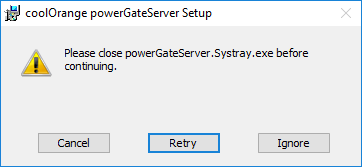Installation
Requirements
Operating System: 64-bit only
Microsoft Windows 7
Microsoft Windows 8.1
Microsoft Windows 10
Microsoft Windows 11
Microsoft Windows Server 2012
Microsoft Windows Server 2016
Microsoft Windows Server 2019
Microsoft Windows Server 2022
.NET Framework: 4.7 or higher
Note
Some Plugins will not be installed by default from the setup but can be enabled during the setup process.
Windows permissions
In order to launch a WebService, the Local System user (or current user when running powerGateServer-Console) requires the rights to register HTTP bindings and listen on the specified address.
Additionally an exception must be added to the firewall configuration to allow inbound connections.
For more details and OS specific settings read: How to configure Http/Https connections.
In order list all the Url-ACL’s, run following command:
netsh http show urlacl
This command will output all the HTTP-Bindings that are configured, and which users are allowed to listen to them.
One URL that everyone can listen is: http://+:80/Temporary_Listen_Addresses/....
Note
By running your plugin on port 80 under address Temporary_Listen_Addresses, you do not need elevated privileges to run your WebService.
In order to add an url reservation, run following command with admin privileges:
netsh http add urlacl url=http://+:8080/MyUri user="Local Service"
Note
This command grants the permission to allow listening all users to PowerGateServer-WebServices:
netsh http add urlacl url=http://+:8080/PGS user=\Everyone
Run this command on Dev-Environment in order to develop your Plugins without launching VisualStudio as Administrator.
Setup
The powerGateServer setup is delivered as a Windows Installer database (.msi) and can be installed using Msiexec.exe
The powerGateServer setup contains the following optional features:
S_SAP: The SAP plugin
S_ERP: The ERP plugin
S_VStemplate: The Visual Studio project template for Visual Studio 2017, 2019 and 2022
To accept the products EULA when the setup is started in silent mode, pass the ACCEPT_EULA=1 argument.
Install Locations
powerGateServer is installed in the following locations on your system:
All program libraries and executable files are placed in C:\Program Files\coolOrange\powerGateServer
All plugins are located in C:\ProgramData\coolOrange\powerGateServer\Plugins
Visual Studio Project Template C:\Users\<Username>\Documents\Visual Studio <Version>\Templates\ProjectTemplates\coolOrange
Following shortcuts are added in the start menu:
powerGateServer System Tray - Starts the Tray Icon in the taskbar
powerGateServer Plugins - Opens the location where the plugins are installed
powerGateServer Console - Starts the application in a Windows Console
powerGateServer Information - Opens the About dialog with product related information
powerGateServer License Information - Opens the License Information dialog to activate the product
powerGateServer Logs - Opens the Windows Event Viewer with the powerGateServer logs
Updates
To install a newer version of powerGateServer just execute the setup file of the new version. This will automatically update the files in the existing installation.
Warning
powerGateServer v16 is not compatible to powerGate versions older than v16.
Manually stopping powerGateServer Systray
When setup fails stopping powerGateServer.Systray process automatically (e.g. because of permission issues), the user is asked to stop the process manually.
This can be done by stopping the process “powerGateServer.Systray.exe” via Task-Manager, and clicking on “Retry” in Setup dialog:

Uninstall
To remove powerGateServer from a system:
Execute the setup file again and select the repair or remove powerGateServer option. Click on “Remove” to uninstall the program.
Go to “Control Panel - Programs and Features”, find “coolOrange powerGateServer” and run “Uninstall”.